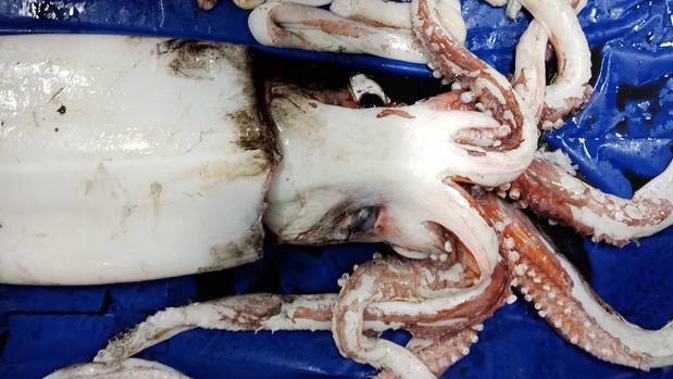
Niwa scientists got a slimy surprise when they hauled up a trawl net to find a 110kg giant squid inside.
The big cephalopod, pulled from a depth of 442m at the Chatham Rise east of New Zealand last month, was among a trove of unexpected finds from the deep.
Niwa's research vessel Tangaroa was carrying out trawls in the area as part of survey of hoki, New Zealand's most valuable commercial fish species.
When one trawl was brought up, scientists were surprised to spot huge tentacles among the fish caught in the net.
Voyage leader and Niwa fisheries scientist Darren Stevens was on watch at the time and said it took six staff to lift the squid, weighing about 110kg, onto a tarpaulin.
While the squid was more than 4m long, Stevens described it as "probably on the smallish side".
He said the ship was abuzz with news of the squid with sleeping scientists roused to take photographs.
"We knew there would be staff who wouldn't be happy if we hadn't woken them for a giant squid."
The squid was examined and dissected by Auckland University of Technology squid researcher Ryan Howard who was onboard to study the eyes of deep sea squid.
Because there are several fully intact giant squid specimens on mainland New Zealand, the crew decided to take nearly 50kg of samples of the scientifically valuable bits including the eyes, head, stomach and reproductive organs.
"We managed to get an 110kg animal down to two 25kg boxes in terms of what was actually kept," Stevens said.
"We took the stomach because virtually nothing is known about a giant squid's diet because every time people seem to catch one, there's very rarely anything in their stomachs."
/arc-anglerfish-syd-prod-nzme.s3.amazonaws.com/public/OSYLD3QM7FGYHHEU4FR55UGLNA.jpg?width=569&height=759&mode=max)
Voyage leader and Niwa fisheries scientist Darren Stevens inspects the giant squid. Photo / Brit Finucci
Stevens said the eyes will be used for research and may shed light on the secret lives of giant squid.
"Getting two giant squid eyes is apparently enough for a scientific paper. They're really rare, and you need a fresh one. So it was a really unique set of circumstances to get two fresh eyes."
The life cycle of giant squid is another mystery.
The statolith – a tiny bone structure in the head – will be used to estimate the age of the squid.
"Currently there's no good way to age a giant squid. It's thought they live for more than one year that's for sure, maybe they live for three or four, but no one really knows."
Niwa researchers caught a giant squid about once a decade.
While giant squid are a global species, Stevens said New Zealand seems to be something of a hotspot for catching them.
"New Zealand is kind of the giant squid capital of the world – anywhere else a giant squid is caught in a net would be a massive deal. But there's been a few caught off New Zealand.
"It's only the second one I've ever seen. I've been on about 40 trips on Tangaroa, and most surveys are about a month, and I've only ever seen two. That's pretty rare."
Take your Radio, Podcasts and Music with you







